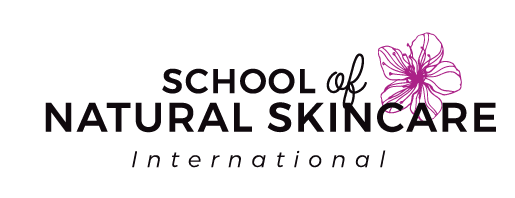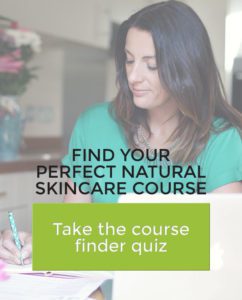We are frequently asked about natural preservatives for cosmetics. So today we are sharing three broad spectrum preservatives, either derived from natural sources or nature identical, that are readily available, easy to use and carry organic certification.
Would you rather download this guide and learn about natural emulsifiers too? Then click below for your free guide!
When and why do you need to use preservatives?
Cosmetic products need to be be preserved in order to prevent microbial spoilage that would make the product unsafe for consumers.
Preservatives play a very important function in products containing water: they kill microorganisms and prevent the growth of bacteria, mold and yeast. If a product contains water (including hydrosols, floral water and aloe vera juice, all of which contain water), a preservative is essential to help prevent microbes growing.
Anhydrous (water-free) products generally don’t require preservatives as they are not prone to microbial contamination. This includes products like lip balms and anhydrous whipped body butters. The exception here is an anhydrous product that might come into contact with water (eg a body scrub or a cleansing balm applied with wet fingers). With these types of products you either need to be very careful not to introduce water to the product during use, or you should include a preservative.
You will need to use a broad-spectrum preservative, which means it is effective against bacteria, mold and yeast.
It’s important to follow the manufacturer’s instructions regarding the amount of preservative to use; too much or too little could be potentially hazardous.
The only way to know that your preservative is working effectively is to have a microbiological challenge test carried out by a lab. This is recommended (and in some countries compulsory) if you are selling your products.
Vitamin E, rosemary extract and grapefruit seed extract are not preservatives. We explain why not in our article Natural Preservatives in Skincare: What You Need to Know.
Here are 3 broad spectrum natural preservatives for cosmetics:
The preservatives in the list below are all approved for use in certified organic products. They are either derived from natural sources or are nature identical.
REMEMBER: It is your responsibility to check the efficacy of your preservative system. We strongly recommend having a microbiological challenge test carried out by a lab as this is the only way to be completely sure that your preservative system is effective. You can find more information on product testing here: Guide to cosmetic product testing and safety assessments.
1. Preservative Eco/Geogard ECT
Other trade names include Mikrokill ECT, Geogard ECT and Plantaserv M.
INCI: Benzyl Alcohol (and) Salicylic Acid (and) Glycerin (and) Sorbic Acid
(Meets Ecocert and COSMOS Standards)
This is a broad spectrum preservative which contains four different components: Benzyl Alcohol, Salicylic Acid, Glycerin and Sorbic Acid. These molecules are all found in nature in plants such as pine resin, rowan berries and willow bark. It is a non-paraben, non-formaldehyde, non-isothiazolone based preservative system.
It’s a liquid that is added to the cooling phase of a cream. It has a slight almond-like smell that is normally not detectable in the finished product. Over time, benzyl alcohol oxidizes to benzaldehyde, which has a strong almond smell. Suitable for use in oil-in-water, water-in-oil and water based formulas, so compatible with a wide range of skin, hair and sun care formulations.
Available from Aromantic (UK), Soapmakers Store (UK), Formulator Sample Shop (USA), Voyageur Soap and Candle Company (USA), Alexmo (Germany), New Directions (Australia) (under the trade name Plantaserv M).
It’s usually used at 1% in water based products.
Not permitted in products for children under the age of three years due to the salicylic acid content.
It is supposed to have a wide pH compatibility of pH 3-8, but it’s most effective at pH below 5.5.
2. Geogard 221
INCI: Benzyl Alcohol (and) Dehydroacetic Acid
(Meets Ecocert and COSMOS standards, NaTrue Certified and Soil Association approved)
An Ecocert approved, multi-use, broad spectrum preservative system that is a synergistic blend of an organic acid and alcohol that can be added at room and elevated temperatures. Dehydroacetic Acid and Benzyl Alcohol are both organic compounds which are accepted for use in natural cosmetics, offering a broad spectrum of stability at a wide range of pH. The organic preservative compound is a non-paraben, non-formaldehyde, non isothiazolone based preservative system.
Available from Naturally Thinking (UK), Alexmo (Germany), Making Cosmetics (USA), Go Native (NZ), Manske Shop (Germany), Essentially Natural (SA).
It is water soluble with an effective pH from pH 2-6; it’s most efficient at pH below 5.5.
Typical recommended use level is 0.2-1%.
3. Euxyl K 712/Potassium sorbate and sodium benzoate
INCI: Sodium Benzoate (and) Potassium Sorbate
Available from Naturallythinking (UK) and The Formulator Shop (Africa).
Ecocert-approved mix of two organic acids (sorbic and benzoic acid) commonly used in preserving foods. It is a liquid cosmetic preservative, which can be used in leave-on as well as in rinse-off products. It was developed for use in cosmetic formulations with a skin-friendly pH value of up to 5.5. It has a broad, balanced spectrum of effect against bacteria, yeasts and molds.
Its activity greatly depends on the pH of the product; the lower the pH, the higher the activity. It is best used at pH below 5.5, ideally around 4.0-4.5. Usage rates are between 0.5% and 1.5%. It can be added to the heated water phase, but prolonged heating periods (maximum four hours) above 80°C should be avoided.
potassium sorbate individually (they are widely available separately as powders/pellets). As a replacement for 1% Euxyl K 712 you should add 0.2% potassium sorbate and 0.3% sodium benzoate to your formulation. If you choose to add these, they will need to be added to the water phase and heated until dissolved.
How can we help you further?
Want to know more about natural emulsifiers and preservatives?
Discover the most natural emulsifiers and preservatives for your skincare products by downloading our free guide!
Loved learning about natural preservatives? Save this image below on Pinterest so you can be sure to remember!

















